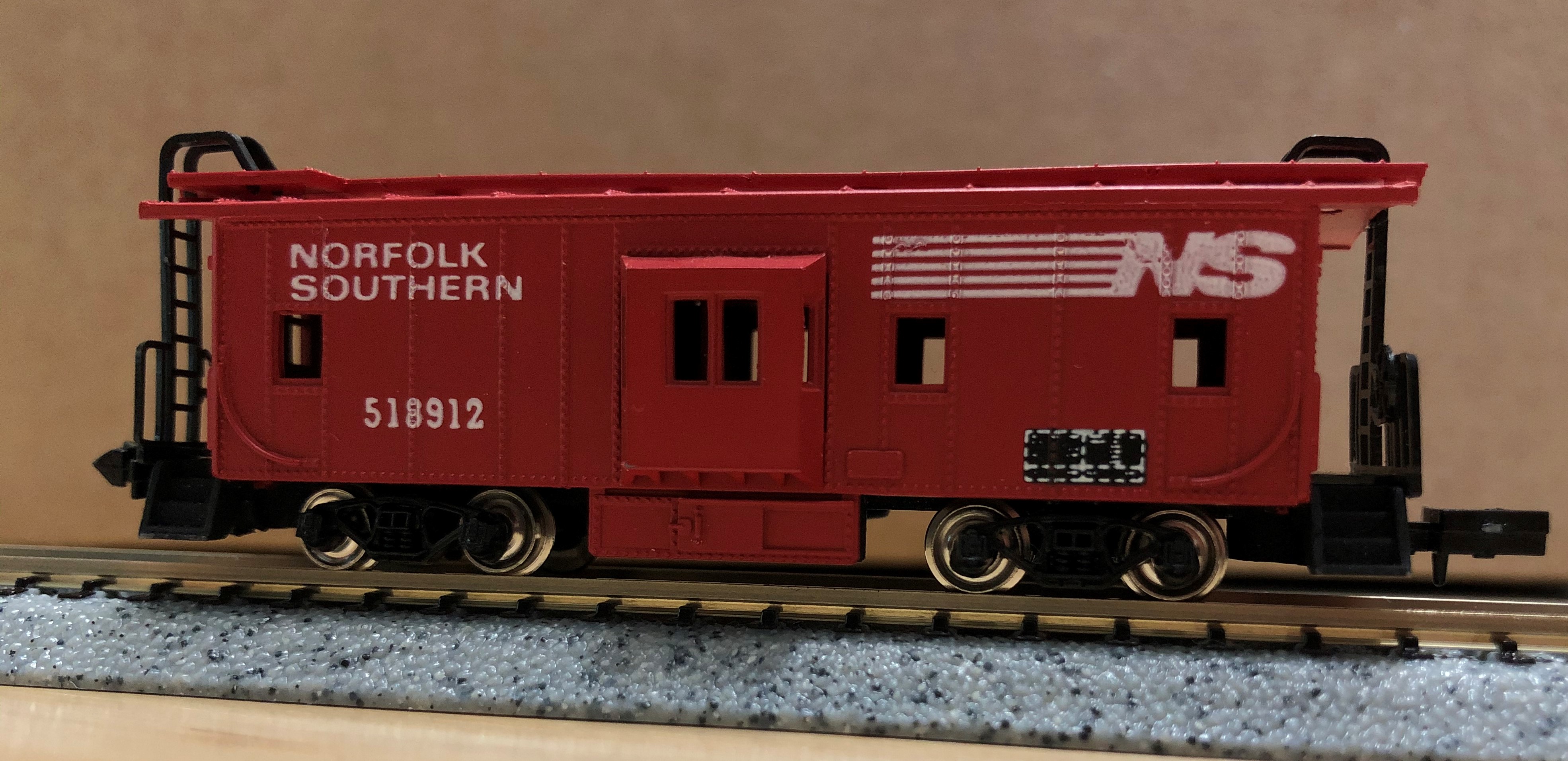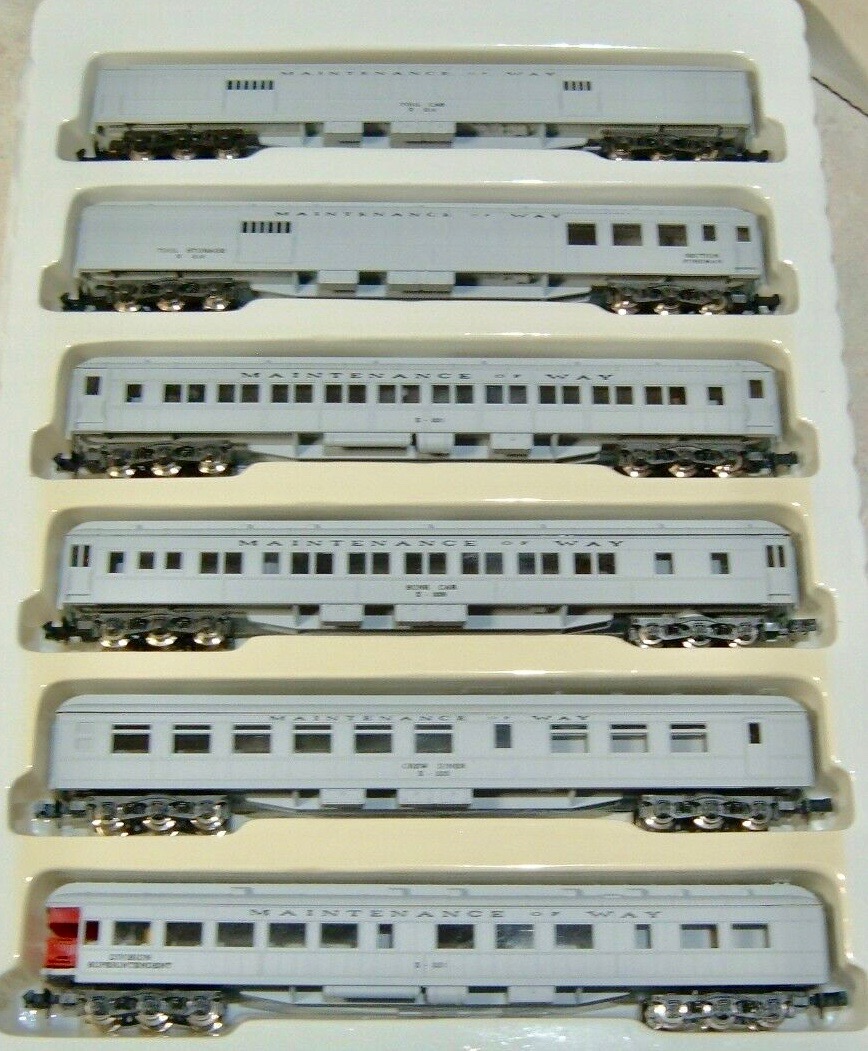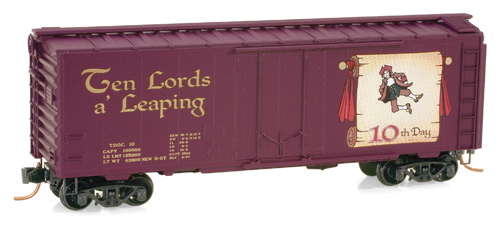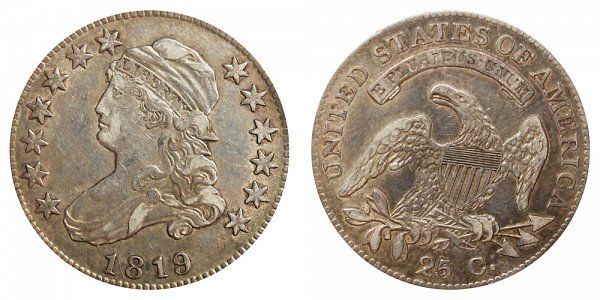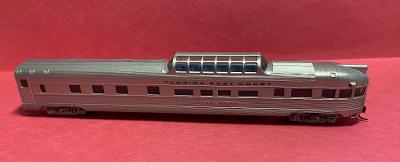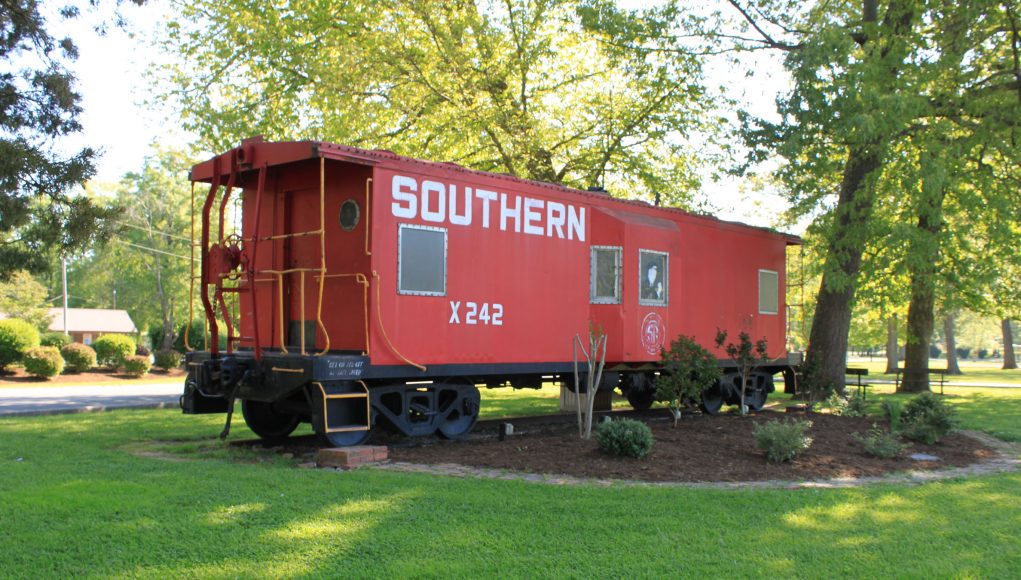Model Information: Originally produced for Con-Cor by Kato in the 1960s, this is one of the original Con-Cor releases. Likely the tooling was moved from Japan to the US facility by Con-Cor in the 1980s, one can expect that the early cars in this series might come from either country. More recently (post-2000) this tooling has been moved to (or re-created in) China.
Prototype History: In a bay window caboose, the crew monitoring the train sits in the middle of the car in a section of wall that projects from the side of the caboose. The windows set into these extended walls resemble architectural bay windows, so the caboose type is called a bay window caboose. This type afforded a better view of the side of the train and eliminated the falling hazard of the cupola. The bay window gained favor with many railroads because it eliminated the need for additional clearances in tunnels and overpasses. On the west coast, the Milwaukee Road and the Northern Pacifc Railway used these cars, converting over 900 roof top cabooses to bay window cabooses in the late 1930's. Milwaukee Road rib-side window cabooses are preserved at New Libson, Wisconsin, the Illinois Railway Museum, the Mt. Rainer Scenic Railroad, and Cedarburg, Wisconsin.
When the shift was made from wooden to steel caboose construction, a new type of caboose also arrived. The new caboose design replaced the traditional roof-mounted “cupola” with “bay-windows” attached to the sides of the caboose. As freight cars grew taller, the effectiveness of cupolas as practical observation points was diminished. This was especially true on lines that suffered from low clearances and were incapable of making cupolas high enough to see over the top of the tallest freight cars. Cabooses were prone to rough handling, and many a trainman was knocked out of his perch in the cupola and injured when he fell. The new caboose design was safer as well as more effective.
When the shift was made from wooden to steel caboose construction, a new type of caboose also arrived. The new caboose design replaced the traditional roof-mounted “cupola” with “bay-windows” attached to the sides of the caboose. As freight cars grew taller, the effectiveness of cupolas as practical observation points was diminished. This was especially true on lines that suffered from low clearances and were incapable of making cupolas high enough to see over the top of the tallest freight cars. Cabooses were prone to rough handling, and many a trainman was knocked out of his perch in the cupola and injured when he fell. The new caboose design was safer as well as more effective.
Road Name History: The Norfolk Southern Railway (reporting mark NS) is a Class I railroad in the United States; began in 1982 and 1990. With headquarters in Norfolk, Virginia, the company operates 36,200 route miles in 22 eastern states, the District of Columbia, and has rights in Canada from Buffalo to Toronto and over the Albany to Montreal route. NS is responsible for maintaining 29,000 miles, with the remainder being operated under trackage rights from other parties responsible for maintenance. The common commodity hauled on the railroad is coal from mines in Indiana, Kentucky, Pennsylvania, Tennessee, Virginia, and West Virginia. The railroad also offers the most intermodal network in eastern North America.
NS is a major transporter of domestic and export coal. The railroad's major sources of the mineral are located in: Pennsylvania's Cambria and Indiana counties, as well as the Monongahela Valley; West Virginia; and the Appalachia regions of Virginia, Kentucky, and Tennessee. In Pennsylvania, NS also receives coal through interchange with R.J. Corman Railroad/Pennsylvania Lines at Cresson, Pennsylvania, originating in the "Clearfield Cluster". NS's export of West Virginia bituminous coal, begins transport on portions of the well-engineered former Virginian Railway and the former N&W double-tracked line in Eastern Virginia to its Lambert's Point coal pier on Hampton Roads at Norfolk. Coal transported by NS is thus exported to steel mills and power plants around the world. The company is also a major transporter of auto parts and completed vehicles. It operates intermodal container and TOFC (trailer on flat car) trains, some in conjunction with other railroads. NS was the first railway to employ roadrailers, which are highway truck trailers with interchangeable wheel sets.
The Norfolk Southern Railway's parent Norfolk Southern Corporation is a Norfolk, Virginia-based parent company. Norfolk Southern Corporation was incorporated on July 23, 1980 in the Commonwealth of Virginia and is publicly traded on the New York Stock Exchange (NYSE) under the symbols NSC. The primary business function of Norfolk Southern Corporation is the rail transportation of raw materials, intermediate products, and finished goods across the Southeast, East, and Midwest United States. The corporation further facilitates transport to the remainder of the United States through interchange with other rail carriers while also serving overseas transport needs by serving several Atlantic and Gulf Coast ports. As of October 1, 2014 Norfolk Southern Corporation's total public stock value was slightly over $34.5 billion.
Read more on Wikipedia.
NS is a major transporter of domestic and export coal. The railroad's major sources of the mineral are located in: Pennsylvania's Cambria and Indiana counties, as well as the Monongahela Valley; West Virginia; and the Appalachia regions of Virginia, Kentucky, and Tennessee. In Pennsylvania, NS also receives coal through interchange with R.J. Corman Railroad/Pennsylvania Lines at Cresson, Pennsylvania, originating in the "Clearfield Cluster". NS's export of West Virginia bituminous coal, begins transport on portions of the well-engineered former Virginian Railway and the former N&W double-tracked line in Eastern Virginia to its Lambert's Point coal pier on Hampton Roads at Norfolk. Coal transported by NS is thus exported to steel mills and power plants around the world. The company is also a major transporter of auto parts and completed vehicles. It operates intermodal container and TOFC (trailer on flat car) trains, some in conjunction with other railroads. NS was the first railway to employ roadrailers, which are highway truck trailers with interchangeable wheel sets.
The Norfolk Southern Railway's parent Norfolk Southern Corporation is a Norfolk, Virginia-based parent company. Norfolk Southern Corporation was incorporated on July 23, 1980 in the Commonwealth of Virginia and is publicly traded on the New York Stock Exchange (NYSE) under the symbols NSC. The primary business function of Norfolk Southern Corporation is the rail transportation of raw materials, intermediate products, and finished goods across the Southeast, East, and Midwest United States. The corporation further facilitates transport to the remainder of the United States through interchange with other rail carriers while also serving overseas transport needs by serving several Atlantic and Gulf Coast ports. As of October 1, 2014 Norfolk Southern Corporation's total public stock value was slightly over $34.5 billion.
Read more on Wikipedia.
Brand/Importer Information: Con-Cor has been in business since 1962. Many things have changed over time as originally they were a complete manufacturing operation in the USA and at one time had upwards of 45 employees. They not only designed the models,but they also built their own molds, did injection molding, painting, printing and packaging on their models.
Currently, most of their manufacturing has been moved overseas and now they import 90% of their products as totally finished goods, or in finished components. They only do some incidental manufacturing today within the USA.
Important Note: The Con-Cor product numbering can be very confusing. Please see here in the article how to properly enter Con-Cor stock numbers in the TroveStar database.
Currently, most of their manufacturing has been moved overseas and now they import 90% of their products as totally finished goods, or in finished components. They only do some incidental manufacturing today within the USA.
Important Note: The Con-Cor product numbering can be very confusing. Please see here in the article how to properly enter Con-Cor stock numbers in the TroveStar database.
Item created by: hwy395south on 2020-02-24 20:27:52. Last edited by Lethe on 2020-05-07 00:00:00
If you see errors or missing data in this entry, please feel free to log in and edit it. Anyone with a Gmail account can log in instantly.
If you see errors or missing data in this entry, please feel free to log in and edit it. Anyone with a Gmail account can log in instantly.


